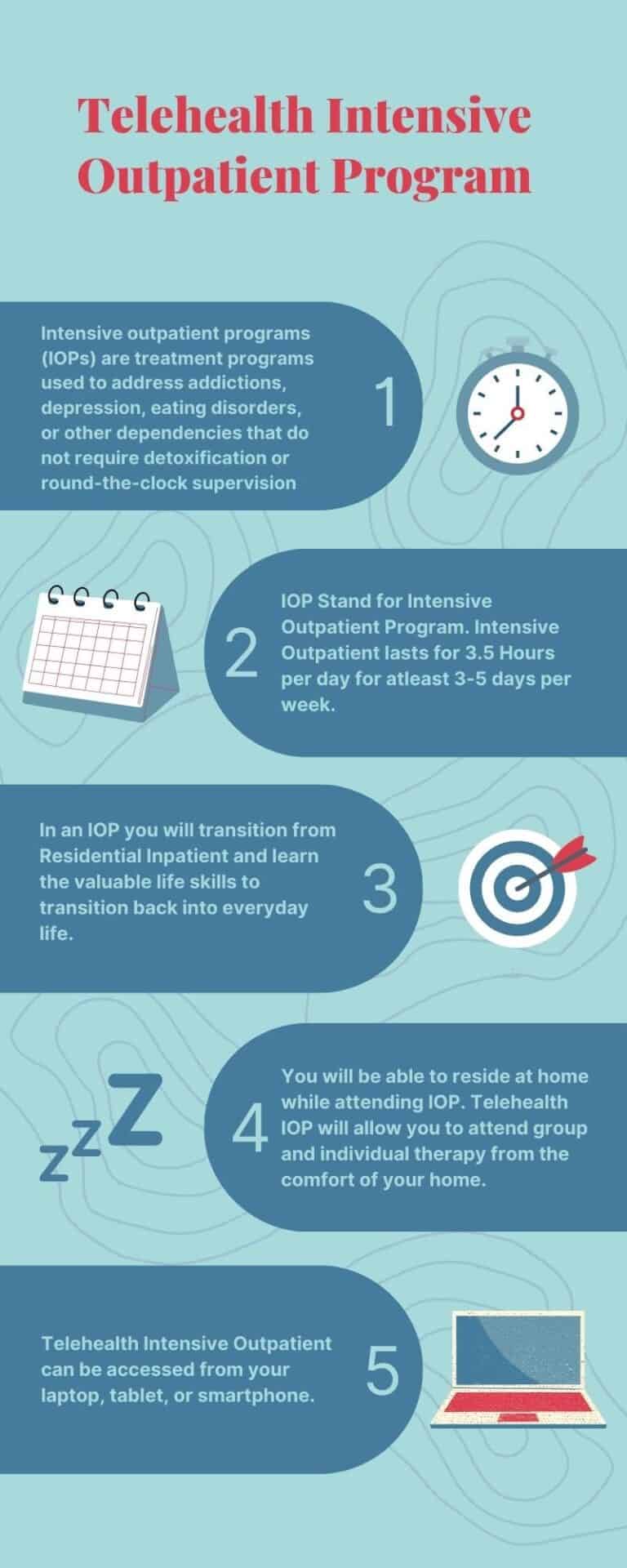Proven Success with Intensive Outpatient Program (IOP) for Chemical Abuse Recuperation.
Proven Success with Intensive Outpatient Program (IOP) for Chemical Abuse Recuperation.
Blog Article
Browsing the Complexities of Dual Diagnosis Therapy Within an Extensive Outpatient Program Establishing
In the realm of psychological health and addiction therapy, the junction of double medical diagnosis provides a nuanced obstacle that demands a comprehensive and customized strategy. Within the boundaries of an Intensive Outpatient Program (IOP) setup, the intricacies of dealing with co-occurring mental health and wellness problems and material make use of disorders require a fragile equilibrium of experience and sources to browse. The assimilation of evidence-based methods, joint initiatives among multidisciplinary teams, and a keen understanding of the special demands of each person are vital elements in properly taking care of twin medical diagnosis within an IOP structure. By discovering the intricacies of double medical diagnosis therapy within this intensive outpatient context, a more clear course arises in the direction of all natural and sustainable recuperation for those facing these intertwined obstacles.
Double Medical Diagnosis Overview
What is the relevance of recognizing twin diagnosis in mental wellness therapy? It is critical to recognize and resolve this comorbidity as it can substantially impact the efficiency of mental health therapy.
Recognizing dual diagnosis is vital as it needs a detailed and integrated approach to treatment. By acknowledging the interaction in between substance usage and mental health and wellness, health care providers can tailor treatments to satisfy the distinct requirements of each individual. This alternative method not just addresses signs however likewise targets hidden aspects that contribute to the double diagnosis.
In addition, neglected dual diagnosis can bring about a cycle of regression and aggravating mental wellness symptoms. By recognizing the intricacy of dual medical diagnosis and providing customized treatment, healthcare experts can support people in attaining long-term recovery and boosted mental wellness.
Tailored Therapy Plans
Recognizing the intricate interplay in between material use conditions and mental wellness problems, the advancement of tailored treatment strategies is paramount in attending to the intricacies of twin diagnosis in psychological health treatment. Tailored treatment strategies are personalized strategies that take into consideration the special needs, challenges, and objectives of individuals facing dual medical diagnosis. These strategies are made collaboratively by a multidisciplinary team of specialists, consisting of psychiatrists, psycho therapists, social workers, and dependency professionals, to make sure detailed and integrated care.
Tailored treatment strategies normally entail a mix of treatments, medications, and behavioral interventions that target both the substance use disorder and the psychological wellness condition concurrently. These plans may consist of cognitive-behavioral therapy, dialectical habits treatment, medication-assisted therapy, individual therapy, team therapy, and family therapy, to name a few evidence-based treatments. By personalizing therapy techniques to private situations, customized strategies can address the source of dual medical diagnosis, promote long-term recovery, and improve total high quality of life for individuals having problem with co-occurring problems.
Integrated Treatment Approach

Additionally, the social aspect of integrated treatment involves attending to environmental elements that may add to the click here to read growth or perpetuation important usage and mental wellness issues. This can include household characteristics, housing instability, or absence of social support. By including social interventions like family members therapy, employment support, and community resources, the treatment becomes a lot more all natural and customized to the individual's specific requirements. Generally, an integrated care approach in dual diagnosis therapy within an intensive outpatient program setup aims to supply comprehensive, efficient, and customized like people encountering co-occurring disorders.
Difficulties in IOP Setting
In the context of dual diagnosis therapy within an intensive outpatient program, navigating the intricacies of co-occurring compound use conditions and psychological health conditions offers substantial difficulties. Among the main hurdles in the IOP setting is the control of treatment between mental wellness professionals and drug abuse specialists to ensure a detailed treatment strategy. This calls for effective interaction, partnership, and a deep understanding of how these conditions communicate and affect each other.
Furthermore, the rising and falling nature of material usage disorders and psychological wellness problems adds an additional layer of complexity - Intensive Outpatient Program (IOP). Clients in an IOP might experience unexpected changes in their symptoms or material yearnings, needing timely treatment and change of treatment methods. Stabilizing the intensity of treatment and assistance while allowing customers the adaptability to manage their daily obligations can be a delicate stability to keep
Moreover, dealing with preconception and resistance to treatment within the IOP setting can click here to read impede progression. Some individuals may be hesitant to reveal their dual diagnosis or might really feel embarrassed, preventing their engagement in the restorative process. Getting rid of these obstacles requires an encouraging and non-judgmental setting that fosters count on and visibility.

Collaborative Specialist Efforts

Joint efforts additionally extend to routine interaction and information sharing amongst staff member to make sure a natural treatment technique - Intensive Outpatient Program (IOP). This might involve situation meetings, joint sessions with the patient, or shared paperwork to track progress and readjust treatment methods as needed. In addition, collaboration might consist of involving various other medical care professionals such as medical care doctors or household specialists to provide holistic support to the individual. Ultimately, an unified front of specialists working together boosts the effectiveness of dual medical diagnosis therapy within an extensive outpatient program.
Conclusion
In conclusion, efficient twin diagnosis therapy within an extensive outpatient program setup needs tailored treatment plans and an integrated treatment method. Difficulties may develop in this setting, however collaborative efforts amongst specialists can assist navigate these complexities. By addressing the one-of-a-kind demands of people with co-occurring psychological health and wellness and compound utilize problems, IOP programs can supply detailed and alternative like support recovery and total health.
Report this page